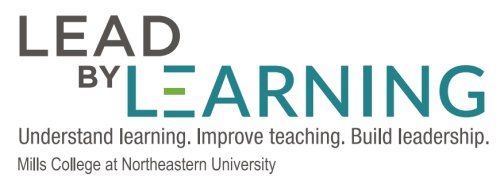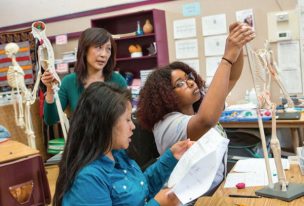Developing Rigorous Literature Study Routines
 In my work with Mills Teacher Scholars last year, I investigated how literature study routines could prepare my students for the demands of the Common Core State Standards. In the end, this was rewarding for both teacher and students, but no easy feat to responsively implement in my diverse classroom.
In my work with Mills Teacher Scholars last year, I investigated how literature study routines could prepare my students for the demands of the Common Core State Standards. In the end, this was rewarding for both teacher and students, but no easy feat to responsively implement in my diverse classroom.
At first read, the CCSS literacy standards for 5th grade feel grandiose, multi-layered and yet nebulous at the same time. My immediate thought was that even the most astute pupil would only begin to develop their proficiency on say, RL.5.5 (how a series of chapters fit together to provide the overall structure of a story) after an entire year of study. So, I planned a year of literature study.
 To get at the heart of the standards themselves, I aimed to facilitate tasks that focused on the action verb written into the standard (i.e. quote, explain, analyze, describe). In leveled reading groups of 3-4 participants per group, students read full-length novels aloud sitting knee-to-knee, discussed their individually written reflections, grappled with text-based and critical-thinking questions, co-published a group response poster and conferred with another group reading the same novel. Whew! It was an arduous process.
To get at the heart of the standards themselves, I aimed to facilitate tasks that focused on the action verb written into the standard (i.e. quote, explain, analyze, describe). In leveled reading groups of 3-4 participants per group, students read full-length novels aloud sitting knee-to-knee, discussed their individually written reflections, grappled with text-based and critical-thinking questions, co-published a group response poster and conferred with another group reading the same novel. Whew! It was an arduous process.
When my 10-year olds would pushback on the rigorous collaborative task of analyzing literature through rereading and discussion (“Why do I have to read this book?” or “Why do I have to work with her?” or “Can’t I just work alone?”), I’d ask myself if perhaps the purpose was getting lost in the process. Yet, at their best moments, the whole of the class and each of the focal students found a groove with the literature work we had been trudging through.
With time, yet not necessarily with consistency, each focal student met the indicators of success I was tracking during my Mills Teacher Scholars sessions:
- They were able to form a concise, written literature response by paying close attention to the syntax of the question.
- In teams, they each produced text citations chosen after carefully combing the text.
- All three focal students wholeheartedly enjoyed the stories themselves and the act of reading literature in an academic setting. I know this because I would hear groups passionately defending plot sequence, character analysis and the intention of the author. These moments were pure glory.
Mini Lessons Respond to Student-Demonstrated Needs
My early observations of the talk data revealed these new 5th graders needed far more support to be efficient and articulate communicators in these discussions. I decided that the stock sentence frames we use for discussion in other subjects were too constraining to unlock the levies of their fiction-reading minds. I didn’t want to hear a bunch of robots repeating the sentence frames and downplaying the excitement of our books.
Students like Esperanza a (lower to mid-level ELD student) hold onto these frames with their life; I was afraid she’d use this scaffold as a crutch and never find her own voice. Knowing she had important contributions, I concentrated my efforts around syntax. Instead of frames, I taught mini lessons on how to construct the initial stem of a literature response using the words from the question.
Early on Esperanza mastered how to rephrase a question as a statement (one of three indicators I tracked throughout the year) and it transformed her oral communication socially and academically. She didn’t sound like a robot, nor did she sound like anyone else in the class.
When I conferenced with Esperanza’s group, I would help to unpack the question and, if needed, guide them back to the text. When it appeared as if her understanding had become unlocked, when she would utter that familiar “O-oohhhh”, then I’d ask the question again. With few exceptions, Esperanza would routinely glance down to reread the specific phrasing of the question, repeating the question in sentence form and attaching her idea to the end. As an English Learner, this one mini lesson (revisited over and over) was the key that unleashed her ideas.
At year’s end, I re-tested Esperanza’s reading level and, without flaw, she applied the skill to her oral comprehension assessment. At the very place where so many English Learners get hung up (figuring out how to start), she no longer paused indefinitely like she did earlier in the year. She still required several moments of think time before speaking or writing, but the start was no longer an additional challenge.
The Challenges of Differentiation and Group Dynamics
The sort of explicit support that Esperanza needed to successfully engage with her group and her novel is not what all students need. Looking closely at student learning during the different steps of our literature study routines, I learned that the process (the series of tasks) should be tight and ritualized, yet  the process should never overshadow the core lesson that novels offer endless enjoyment. For some learners, this can be a hard sell, especially at 1:30pm on a Friday.
the process should never overshadow the core lesson that novels offer endless enjoyment. For some learners, this can be a hard sell, especially at 1:30pm on a Friday.
Marcus, as a focal student, represented those advanced readers in the class who typically underperform for their ability level, meeting only minimal requirements. During our last literature circle meeting, I could hear Marcus’s raucous laugh from across the room. I thought, “Is the novel THAT funny? No. Then, these kids are off-task.” With only a few days left of school, I had wished Marcus was deep in discussion over his novel like he was earlier in the year when he asked if I knew any more books with characters like Naomi from Becoming Naomi Leon – a character with whom I initially didn’t think he’d find a connection.
The challenge Marcus had ascribing to the culture of responsibility and accountability that I established for literature circles, was not an isolated case. Grouping students into productive teams has proven to be the most difficult aspect of this work with intragroup conflict the number one derailer in my room. The “take-home” learning for me around planning for symbiotic working relationships is that surprisingly rich matches can surface from unlikely groupings. There are numerous factors to account for: reading level, Lexile, fluency, prosody, personality, social clique, reading affect and interest, attendance, and many more nuances influence my own teacher moves, and by extension, student learning.
Though Marcus didn’t make a complete turnaround with his goals like Esperanza, he did learn to return to the text and point vehemently to cite evidence using his “outside voice.” This practice didn’t always prove his point or make him a popular reading group partner, but he developed a passion for returning to the text to scour the author’s exact wording (indicator number two).
The Common C ore: Implications for the Classroom
ore: Implications for the Classroom
Until school districts adopt a core-aligned curriculum that speaks to the literature and informational text Common Core State Standards, students typically will read whatever novel that the teacher has enough copies of to go around.
Some educators might argue that what students read makes all the difference. Yet, I would argue that it’s how students read that makes the difference: Are they stopping to reread for clarification? Are they given opportunities to discuss author moves? Are they conferring with others who have alternative perspectives? Are they given tools to support their idea expression without suppressing their unique voice?
Many of us are asking the same questions about how to best support student learning in the Common Core era. By asking questions about my own classroom and analyzing student learning in this area, I learned that facilitating these multi-stepped, multi-layered rigorous routines is challenging and not always perfect. There are successes to celebrate and social nuances around how students co-construct meaning to further analyze. Having done this Mills Teacher Scholars inquiry I am better positioned to facilitate collaborative groupings in the future.


